人教版(2019)必修第三册Unit2 Morals and Virtues Revision课件(21张ppt)
文档属性
| 名称 | 人教版(2019)必修第三册Unit2 Morals and Virtues Revision课件(21张ppt) |
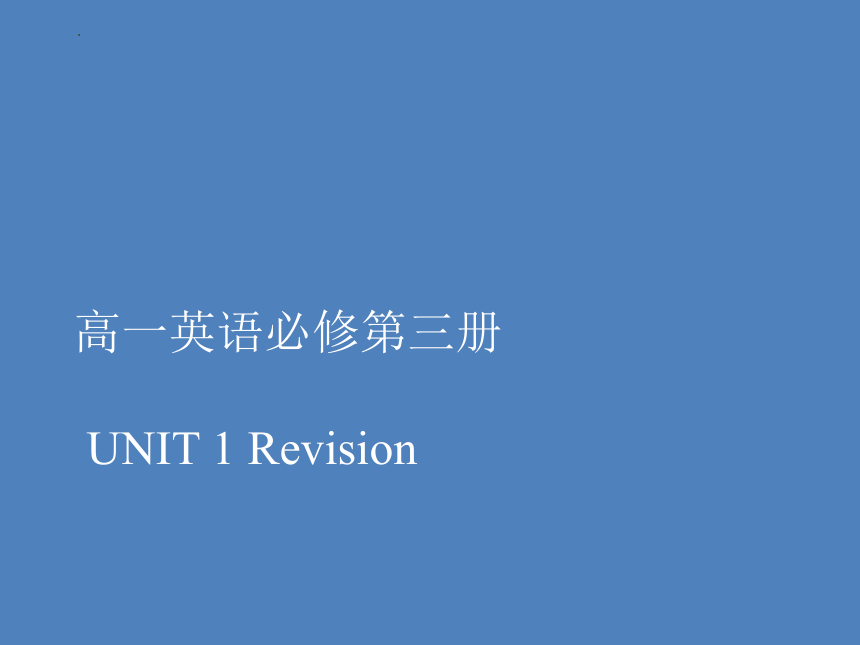
|
|
| 格式 | zip | ||
| 文件大小 | 110.5KB | ||
| 资源类型 | 教案 | ||
| 版本资源 | 人教版(2019) | ||
| 科目 | 英语 | ||
| 更新时间 | 2022-05-06 16:52:03 | ||
图片预览

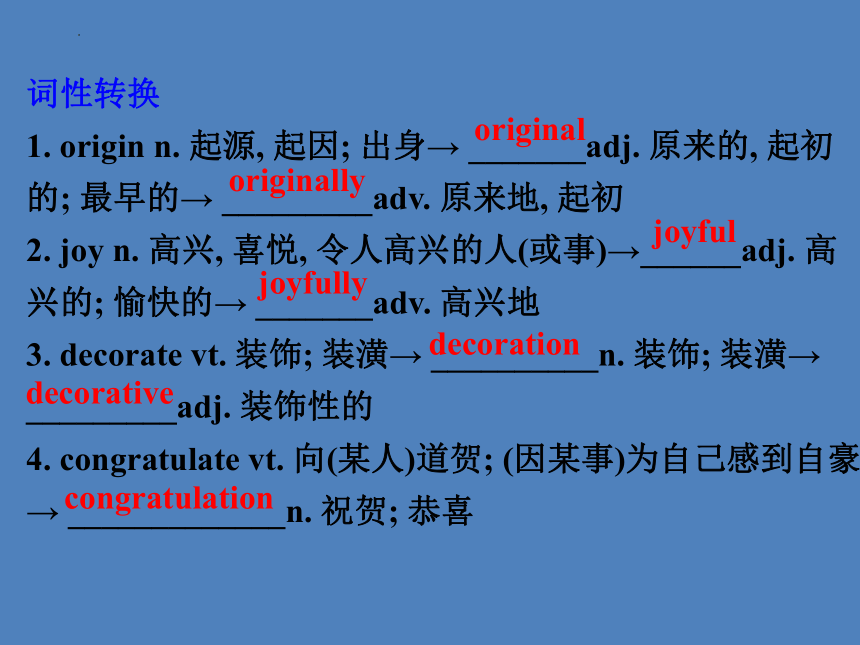
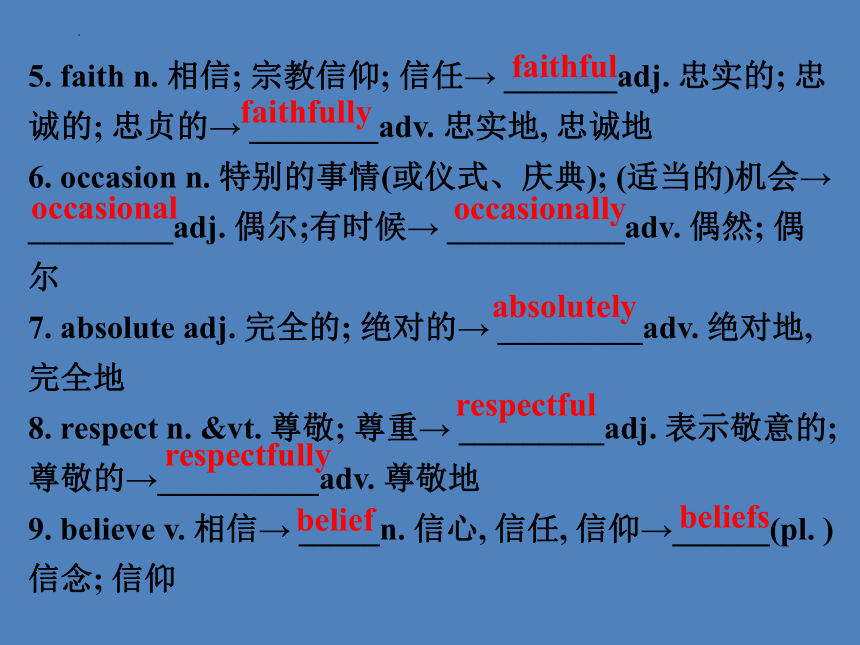
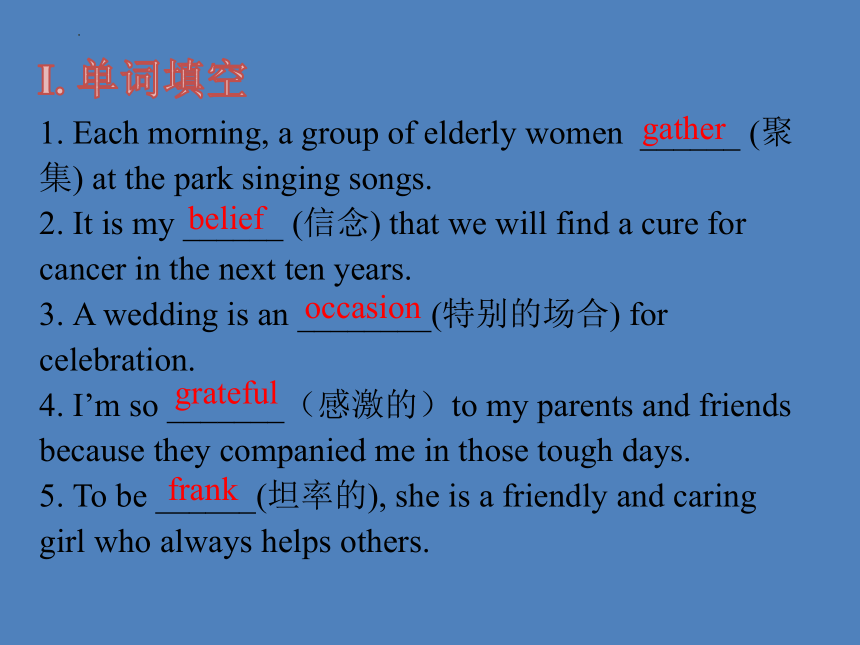

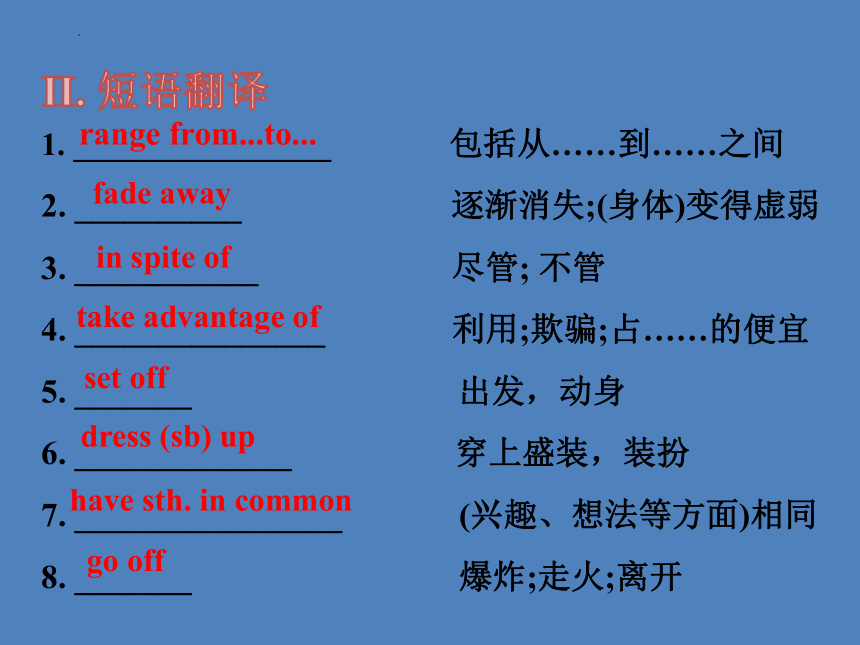
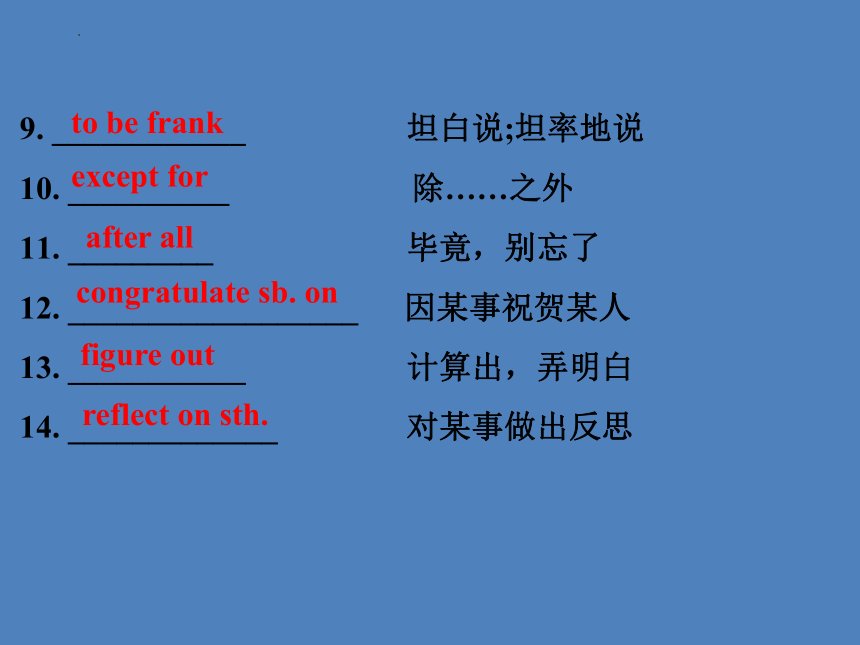
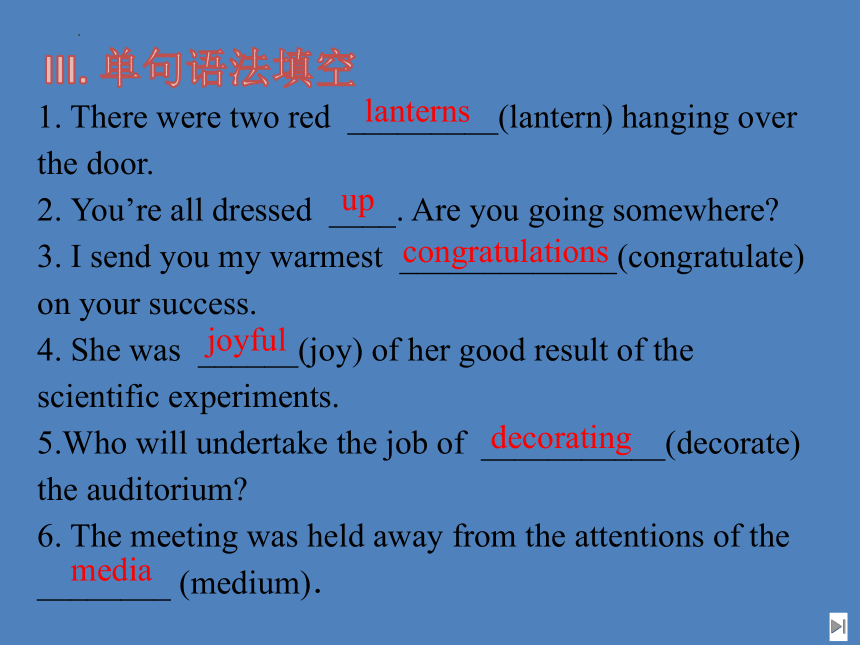

文档简介
(共21张PPT)
高一英语必修第三册
UNIT 1 Revision
词性转换
1. origin n. 起源, 起因; 出身→ _______adj. 原来的, 起初的; 最早的→ _________adv. 原来地, 起初
2. joy n. 高兴, 喜悦, 令人高兴的人(或事)→______adj. 高兴的; 愉快的→ _______adv. 高兴地
3. decorate vt. 装饰; 装潢→ __________n. 装饰; 装潢→ _________adj. 装饰性的
4. congratulate vt. 向(某人)道贺; (因某事)为自己感到自豪→ _____________n. 祝贺; 恭喜
original
originally
joyful
joyfully
decoration
decorative
congratulation
5. faith n. 相信; 宗教信仰; 信任→ _______adj. 忠实的; 忠诚的; 忠贞的→ ________adv. 忠实地, 忠诚地
6. occasion n. 特别的事情(或仪式、庆典); (适当的)机会→ _________adj. 偶尔;有时候→ ___________adv. 偶然; 偶尔
7. absolute adj. 完全的; 绝对的→ _________adv. 绝对地, 完全地
8. respect n. &vt. 尊敬; 尊重→ _________adj. 表示敬意的;
尊敬的→__________adv. 尊敬地
9. believe v. 相信→ _____n. 信心, 信任, 信仰→______(pl. )信念; 信仰
faithful
faithfully
occasional
occasionally
absolutely
respectful
respectfully
belief
beliefs
1. Each morning, a group of elderly women ______ (聚集) at the park singing songs.
2. It is my ______ (信念) that we will find a cure for cancer in the next ten years.
3. A wedding is an ________(特别的场合) for celebration.
4. I’m so _______(感激的)to my parents and friends because they companied me in those tough days.
5. To be ______(坦率的), she is a friendly and caring girl who always helps others.
gather
belief
occasion
grateful
frank
Ⅰ. 单词填空
6. Eating fruit and exercising everyday let her have a slim _______(身材).
7. He is a _____(花哨的)boy who likes to wear strange clothes.
8. At this _______(片刻,瞬间), my tears poured down.
9. I want to express my great _____________(祝贺)on your newly born baby.
10. We should show our sincere ________(尊敬)to those soldiers who died for our country and the victims of the Nanjing Massacre(南京大屠杀).
figure
fancy
moment
respect
congratulations
1. ________________ 包括从……到……之间
2. __________ 逐渐消失;(身体)变得虚弱
3. ___________ 尽管; 不管
4. _______________ 利用;欺骗;占……的便宜
5. _______ 出发,动身
6. _____________ 穿上盛装,装扮
7. ________________ (兴趣、想法等方面)相同
8. _______ 爆炸;走火;离开
range from...to...
fade away
in spite of
take advantage of
set off
dress (sb) up
have sth. in common
go off
II. 短语翻译
9. ____________ 坦白说;坦率地说
10. __________ 除……之外
11. _________ 毕竟,别忘了
12. __________________ 因某事祝贺某人
13. ___________ 计算出,弄明白
14. _____________ 对某事做出反思
except for
after all
congratulate sb. on
figure out
to be frank
reflect on sth.
1. There were two red _________(lantern) hanging over the door.
2. You’re all dressed ____. Are you going somewhere
3. I send you my warmest _____________(congratulate) on your success.
4. She was ______(joy) of her good result of the scientific experiments.
5.Who will undertake the job of ___________(decorate) the auditorium
6. The meeting was held away from the attentions of the ________ (medium).
lanterns
up
congratulations
joyful
decorating
media
III. 单句语法填空
7. I admire his passionate ______(believe) in what he is doing.
8. He hadn’t eaten anything except ____ one forkful of salad.
9. Do you fancy ______ (go) to see a movie sometime
10. Don't miss the chance! Take advantage ___ our free offer now!
11. Have you noticed what characteristics these people have ___ common
12. They are both very ________ (religion) and think it is a gift from God.
belief
for
going
of
in
religious
in spite of, after all, congratulate sb. on, range from…to…, go off, figure out,
fade away, take advantage of, set off, except for, dress sb. up, to be frank
IV. 选词填空
1. I would like to ________________ this chance to express my sincere gratitude for your help.
2. We decided to _______ at dawn so that we can get to the seaside before lunch time.
3. Su Yiming _____________________ his own performance in Beijing Winter Olympic Games.
4. I can’t ___________ this math problem.
5. He is a good person __________ drinking too much sometimes.
6. I do like her— _______, she is my sister.
take advantage of
set off
figure out
congratulated himself on
except for
after all
7. We ______________as a policeman.
8. There were 120 students whose ages ____________________(包括从10岁到18岁之间).
9. Kelly loved her husband _________ his rude behavior.
10. ________ with you, I think your son has little chance of
passing the exam.
11. The bomb ________ in a crowded street.
12. Lack of exercise during the COVID-19 outbreak, she simply ___________.
dressed him up
ranged from 10 to 18
in spite of
To be frank
went off
faded away
Today’s festivals have 1.__ wide range of origins, 2.__________(include) the seasons of the year, famous figures, important events, and religions. All festivals have the spirit of 3.________(share) joy, gratitude, love, or peace in common.
The harvest festival is one of the 4._____(much) popular festivals and is celebrated in many cultures. In China, families gather 5.________(admire) the shining moon and enjoy delicious mooncakes during the Mid-Autumn Festival. Customs play a significant role 6.___ festivals, 7.________(gradual), they change over time. For example, some Chinese cities no longer allow firecrackers during the
IV. 语法填空(一)
a
including
sharing
most
to admire
in
gradually
Spring Festival, as they can increase air 8.________ (pollute). However, these days, festivals are becoming
more and more commercial, with people 9._______(spend) more money on gifts, 10.______results in different opinions.
Festivals are an important part of society. They reflect people’s wishes, 11.______(believe), faiths, and attitudes towards life. They are occasions that allow us to relax and enjoy life.
pollution
which
spending
beliefs
The temple fair(庙会) was originally a showing activity, 1. __________ (entertain) people by the Buddhism and Taoism(道教) organizations. Later some worship activities of folk beliefs 2.________(appear) in the Buddhist temples and Taoist temples. When the festival ceremonies were held by the Buddhism and Taoism, various kinds of folk organizations came there 3. ______(add) to the fun.
In this way, the Buddhist temples and the Taoist temples were 4._________(gradual) becoming the sites for mass 5._________(gather) for the religious activities. As time passed, the temple fair has become the main
entertaining
appeared
to add
gradually
gatherings
IV. 语法填空(二)
trading market for people to purchase 6.______(day) necessities. With the secularization(世俗化) of the religious activities, the temple fair activities have been popularized and become active. The custom of holding the regular temple fair can 7.________ (find)everywhere. Many a large temple fair 8.__(be) uncommonly busy, and there are many local operas playing besides the trading activities. Especially during the Spring Festival, temple fairs in some important temples are hugely crowded with people 9._______ take the opportunity to worship the Buddha and beg 10.___ good luck in the new year.
daily
be found
is
for
who/that
1. 自古以来,世界各地就有各种各样的节日和庆典。
2. 有些节日是为了纪念死者,或使祖先们得到满足。
3. 例如,中国的端午节是为了纪念著名古代诗人屈原的。
4. 中国和日本都有中秋节,人们会赏月。在中国,人们还品尝月饼。
5. 中国人过春节要吃饺子、鱼和肉,还要给孩子们红纸包着的压岁钱。
VI. 写作(句子翻译)
1. Festivals and celebrations of all kinds have been held everywhere since ancient times.
2. Some festivals are held to honour the dead or to satisfy the ancestors.
3. For example, the Dragon Boat Festival in China honours the famous ancient poet, Qu Yuan.
4. Both China and Japan have mid-autumn festivals, when people admire the moon. In China, we Chinese enjoy delicious mooncakes.
5. During the Spring Festival in China, people eat dumplings, fish and meat and may give children lucky money in red paper.
你的外国笔友David向你了解中国传统节日,请以清明节为例进行介绍。要求包括以下内容:
1. 清明节的历史
2. 清明节的时间
3. 节日习俗以及人们所举行的活动
4. 节日的意义
100词左右
提示词:Tomb-Sweeping Day清明节;worship their ancestors祭拜祖先;go for an outing 踏青;play on the swing荡秋千
VI. 写作(作文)
1. 清明节是中国的传统节日之一, 历史悠久。
2. 清明节一般在每年的4月5日左右。
3. 清明节期间,人们会扫墓、祭祖,以示对亡者的尊敬。
4. 人们还会踏青、放风筝。
The Tomb-Sweeping Day is one of the traditional festivals in China with a long history.
It usually falls around April fifth every year.
During Tomb-Sweeping Day, people went back to their hometown to worship their ancestors and clean the tombs, expressing their respect and sorrow to the dead.
What’s more, people often go for an outing and fly kites .
The Tomb-Sweeping Day is a traditional Chinese festival with a history of 2500 years, which is also the most important sacrifice festival. It falls around April fifth. During Tomb-Sweeping Day, people went back to their hometown to worship their ancestors and clean the tombs, expressing their respect and sorrow to the dead. What’s more, people often go for an outing and children like to fly kites and play on the swing. All in all, Tomb-Sweeping Day is a recognition and respect of Chinese traditional culture. Not only is it an important festival in the traditional customs of the ancients, but also is the most important festival of memorial ceremony.
高一英语必修第三册
UNIT 1 Revision
词性转换
1. origin n. 起源, 起因; 出身→ _______adj. 原来的, 起初的; 最早的→ _________adv. 原来地, 起初
2. joy n. 高兴, 喜悦, 令人高兴的人(或事)→______adj. 高兴的; 愉快的→ _______adv. 高兴地
3. decorate vt. 装饰; 装潢→ __________n. 装饰; 装潢→ _________adj. 装饰性的
4. congratulate vt. 向(某人)道贺; (因某事)为自己感到自豪→ _____________n. 祝贺; 恭喜
original
originally
joyful
joyfully
decoration
decorative
congratulation
5. faith n. 相信; 宗教信仰; 信任→ _______adj. 忠实的; 忠诚的; 忠贞的→ ________adv. 忠实地, 忠诚地
6. occasion n. 特别的事情(或仪式、庆典); (适当的)机会→ _________adj. 偶尔;有时候→ ___________adv. 偶然; 偶尔
7. absolute adj. 完全的; 绝对的→ _________adv. 绝对地, 完全地
8. respect n. &vt. 尊敬; 尊重→ _________adj. 表示敬意的;
尊敬的→__________adv. 尊敬地
9. believe v. 相信→ _____n. 信心, 信任, 信仰→______(pl. )信念; 信仰
faithful
faithfully
occasional
occasionally
absolutely
respectful
respectfully
belief
beliefs
1. Each morning, a group of elderly women ______ (聚集) at the park singing songs.
2. It is my ______ (信念) that we will find a cure for cancer in the next ten years.
3. A wedding is an ________(特别的场合) for celebration.
4. I’m so _______(感激的)to my parents and friends because they companied me in those tough days.
5. To be ______(坦率的), she is a friendly and caring girl who always helps others.
gather
belief
occasion
grateful
frank
Ⅰ. 单词填空
6. Eating fruit and exercising everyday let her have a slim _______(身材).
7. He is a _____(花哨的)boy who likes to wear strange clothes.
8. At this _______(片刻,瞬间), my tears poured down.
9. I want to express my great _____________(祝贺)on your newly born baby.
10. We should show our sincere ________(尊敬)to those soldiers who died for our country and the victims of the Nanjing Massacre(南京大屠杀).
figure
fancy
moment
respect
congratulations
1. ________________ 包括从……到……之间
2. __________ 逐渐消失;(身体)变得虚弱
3. ___________ 尽管; 不管
4. _______________ 利用;欺骗;占……的便宜
5. _______ 出发,动身
6. _____________ 穿上盛装,装扮
7. ________________ (兴趣、想法等方面)相同
8. _______ 爆炸;走火;离开
range from...to...
fade away
in spite of
take advantage of
set off
dress (sb) up
have sth. in common
go off
II. 短语翻译
9. ____________ 坦白说;坦率地说
10. __________ 除……之外
11. _________ 毕竟,别忘了
12. __________________ 因某事祝贺某人
13. ___________ 计算出,弄明白
14. _____________ 对某事做出反思
except for
after all
congratulate sb. on
figure out
to be frank
reflect on sth.
1. There were two red _________(lantern) hanging over the door.
2. You’re all dressed ____. Are you going somewhere
3. I send you my warmest _____________(congratulate) on your success.
4. She was ______(joy) of her good result of the scientific experiments.
5.Who will undertake the job of ___________(decorate) the auditorium
6. The meeting was held away from the attentions of the ________ (medium).
lanterns
up
congratulations
joyful
decorating
media
III. 单句语法填空
7. I admire his passionate ______(believe) in what he is doing.
8. He hadn’t eaten anything except ____ one forkful of salad.
9. Do you fancy ______ (go) to see a movie sometime
10. Don't miss the chance! Take advantage ___ our free offer now!
11. Have you noticed what characteristics these people have ___ common
12. They are both very ________ (religion) and think it is a gift from God.
belief
for
going
of
in
religious
in spite of, after all, congratulate sb. on, range from…to…, go off, figure out,
fade away, take advantage of, set off, except for, dress sb. up, to be frank
IV. 选词填空
1. I would like to ________________ this chance to express my sincere gratitude for your help.
2. We decided to _______ at dawn so that we can get to the seaside before lunch time.
3. Su Yiming _____________________ his own performance in Beijing Winter Olympic Games.
4. I can’t ___________ this math problem.
5. He is a good person __________ drinking too much sometimes.
6. I do like her— _______, she is my sister.
take advantage of
set off
figure out
congratulated himself on
except for
after all
7. We ______________as a policeman.
8. There were 120 students whose ages ____________________(包括从10岁到18岁之间).
9. Kelly loved her husband _________ his rude behavior.
10. ________ with you, I think your son has little chance of
passing the exam.
11. The bomb ________ in a crowded street.
12. Lack of exercise during the COVID-19 outbreak, she simply ___________.
dressed him up
ranged from 10 to 18
in spite of
To be frank
went off
faded away
Today’s festivals have 1.__ wide range of origins, 2.__________(include) the seasons of the year, famous figures, important events, and religions. All festivals have the spirit of 3.________(share) joy, gratitude, love, or peace in common.
The harvest festival is one of the 4._____(much) popular festivals and is celebrated in many cultures. In China, families gather 5.________(admire) the shining moon and enjoy delicious mooncakes during the Mid-Autumn Festival. Customs play a significant role 6.___ festivals, 7.________(gradual), they change over time. For example, some Chinese cities no longer allow firecrackers during the
IV. 语法填空(一)
a
including
sharing
most
to admire
in
gradually
Spring Festival, as they can increase air 8.________ (pollute). However, these days, festivals are becoming
more and more commercial, with people 9._______(spend) more money on gifts, 10.______results in different opinions.
Festivals are an important part of society. They reflect people’s wishes, 11.______(believe), faiths, and attitudes towards life. They are occasions that allow us to relax and enjoy life.
pollution
which
spending
beliefs
The temple fair(庙会) was originally a showing activity, 1. __________ (entertain) people by the Buddhism and Taoism(道教) organizations. Later some worship activities of folk beliefs 2.________(appear) in the Buddhist temples and Taoist temples. When the festival ceremonies were held by the Buddhism and Taoism, various kinds of folk organizations came there 3. ______(add) to the fun.
In this way, the Buddhist temples and the Taoist temples were 4._________(gradual) becoming the sites for mass 5._________(gather) for the religious activities. As time passed, the temple fair has become the main
entertaining
appeared
to add
gradually
gatherings
IV. 语法填空(二)
trading market for people to purchase 6.______(day) necessities. With the secularization(世俗化) of the religious activities, the temple fair activities have been popularized and become active. The custom of holding the regular temple fair can 7.________ (find)everywhere. Many a large temple fair 8.__(be) uncommonly busy, and there are many local operas playing besides the trading activities. Especially during the Spring Festival, temple fairs in some important temples are hugely crowded with people 9._______ take the opportunity to worship the Buddha and beg 10.___ good luck in the new year.
daily
be found
is
for
who/that
1. 自古以来,世界各地就有各种各样的节日和庆典。
2. 有些节日是为了纪念死者,或使祖先们得到满足。
3. 例如,中国的端午节是为了纪念著名古代诗人屈原的。
4. 中国和日本都有中秋节,人们会赏月。在中国,人们还品尝月饼。
5. 中国人过春节要吃饺子、鱼和肉,还要给孩子们红纸包着的压岁钱。
VI. 写作(句子翻译)
1. Festivals and celebrations of all kinds have been held everywhere since ancient times.
2. Some festivals are held to honour the dead or to satisfy the ancestors.
3. For example, the Dragon Boat Festival in China honours the famous ancient poet, Qu Yuan.
4. Both China and Japan have mid-autumn festivals, when people admire the moon. In China, we Chinese enjoy delicious mooncakes.
5. During the Spring Festival in China, people eat dumplings, fish and meat and may give children lucky money in red paper.
你的外国笔友David向你了解中国传统节日,请以清明节为例进行介绍。要求包括以下内容:
1. 清明节的历史
2. 清明节的时间
3. 节日习俗以及人们所举行的活动
4. 节日的意义
100词左右
提示词:Tomb-Sweeping Day清明节;worship their ancestors祭拜祖先;go for an outing 踏青;play on the swing荡秋千
VI. 写作(作文)
1. 清明节是中国的传统节日之一, 历史悠久。
2. 清明节一般在每年的4月5日左右。
3. 清明节期间,人们会扫墓、祭祖,以示对亡者的尊敬。
4. 人们还会踏青、放风筝。
The Tomb-Sweeping Day is one of the traditional festivals in China with a long history.
It usually falls around April fifth every year.
During Tomb-Sweeping Day, people went back to their hometown to worship their ancestors and clean the tombs, expressing their respect and sorrow to the dead.
What’s more, people often go for an outing and fly kites .
The Tomb-Sweeping Day is a traditional Chinese festival with a history of 2500 years, which is also the most important sacrifice festival. It falls around April fifth. During Tomb-Sweeping Day, people went back to their hometown to worship their ancestors and clean the tombs, expressing their respect and sorrow to the dead. What’s more, people often go for an outing and children like to fly kites and play on the swing. All in all, Tomb-Sweeping Day is a recognition and respect of Chinese traditional culture. Not only is it an important festival in the traditional customs of the ancients, but also is the most important festival of memorial ceremony.
